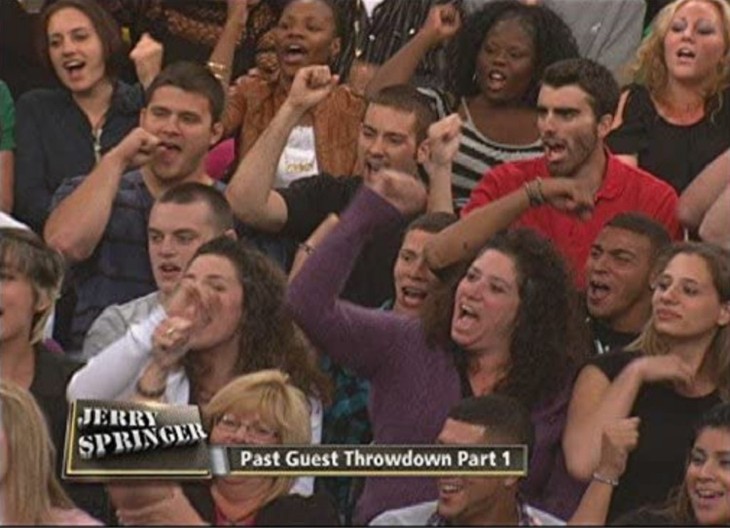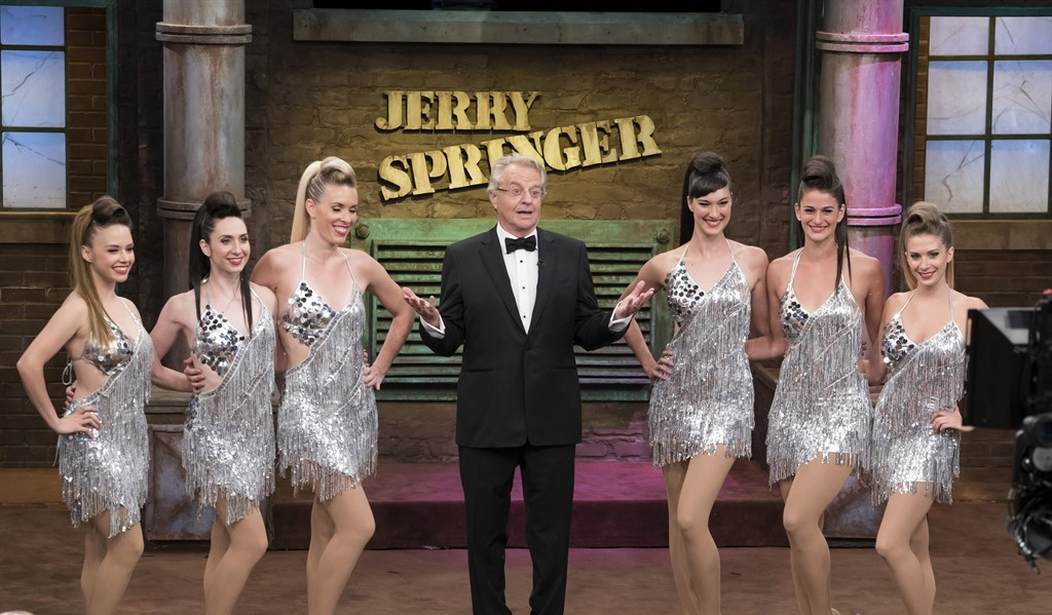Variety is reporting that daytime talk show host legend, news anchor, and former mayor Jerry Springer has passed away. He was 79.
Springer died Thursday at his home in the Chicago suburbs. The cause was pancreatic cancer, Jene Galvin, a lifelong friend and spokesman for the family, confirmed to People. “Jerry’s ability to connect with people was at the heart of his success in everything he tried whether that was politics, broadcasting or just joking with people on the street who wanted a photo or a word,” Galvin said in a statement obtained by Variety. “He’s irreplaceable and his loss hurts immensely, but memories of his intellect, heart and humor will live on.” […]
He is survived by his wife, Micki Velton, to whom he had been married since 1973, and a daughter, Katie.
Of course, most people know Springer from his highly successful daytime talk show, “The Jerry Springer Show,” which aired from 1991 to 2018. Variety reports that “in 1998 at the height of its popularity, [Springer’s show] beat ‘The Oprah Winfrey Show’ in the ratings, drawing 12 million viewers.”
During the show’s run, the rowdy audience members often drew as much of the focus of attention as the guests, or even Springer himself.

My guess is that they’re chanting the famous “Jerry! Jerry!” that greeted viewers at the start of every show.
But Springer was more than just a talk show host, something which I’ll dive into deeper in a VIP post.
Gerald Norman “Jerry” Springer was born in Highgate, London, England, to Jewish refugees from Germany (the area is now part of Poland). Both of his grandmothers died in Nazi concentration camps.
In January 1949, when Springer was just shy of 5 years old, the family emigrated to the U.S., settling in Kew Gardens, Queens, New York. He and his sister, Evelyn, grew up in a small apartment. Springer earned a B.A. in political science from Tulane University in 1965 — becoming “a full-fledged member of the civil rights and antiwar generation,” according to a 1989 profile in People magazine — and a J.D. degree from Northwestern University in 1968.
Springer became a political campaign adviser to Robert F. Kennedy, according to a 1998 profile of Springer in Slate written by David Plotz. After Kennedy’s assassination, he joined the Cincinnati law firm of Frost & Jacobs (now Frost Brown Todd).
Variety‘s obituary for Springer continues with what sparked his political career:
Springer spearheaded the effort to lower the voting age in Ohio, testifying before the Senate Judiciary Committee in support of ratification of the 26th Amendment. He impressed local Democrats, and at 25 he ran for Congress as a Democrat in 1970, taking 45% of the vote in a traditionally Republican district. Three days after announcing his candidacy, Springer, an Army reservist at the time, was called to active duty and deployed to Fort Knox; he continued with his campaign after discharge.
Then, there was the first controversy of Springer’s career when, it’s rumored, he got caught paying for a prostitute because he wrote her a check.
Springer was elected to the Cincinnati City Council in 1971 but resigned three years later after admitting at a press conference to hiring a prostitute.
But Jerry Springer didn’t give up:
Springer managed to win back his seat in 1975. In 1977, when he ran again, Springer received more votes than any other candidate for the council, which meant, under local law, that he was elected mayor. While mayor he initiated change in the local jails. When neo-Nazis applied to march, Springer was conflicted, having lost relatives in the camps. But he was a staunch advocate of the First Amendment, and allowed them to march.
In 1982, Springer sought the Democratic nomination for governor of Ohio but finished a distant third.
Springer considered runs for the U.S. Senate in 2000 and 2004, but opted against it.
It was his position as Cincinnati’s mayor that led to his entering news broadcasting, and eventually, put together the puzzle pieces of what became “The Jerry Springer Show”:
While mayor of Cincinnati, he offered commentaries that appeared on album-oriented rock radio station WEBN-FM under the banner “The Springer Memorandum.” These commentaries proved popular, leading to a full-time job in broadcasting: Springer was hired as a political reporter and commentator on NBC affiliate WLWT, at the time the station with the lowest-rated news show in the Cincinnati market. Later, after he’d been named primary news anchor as well as managing editor, he sought a catchphrase in the tradition of great television newsmen. With the help of some fellow station employees, he devised his signature line: “Take care of yourself, and each other.” Within two years he was Cincinnati’s No. 1 news anchor, together with partner Norma Rashid. He was the most popular anchor in the city for five years, according to Plotz’s 1998 Slate article, drawing 10 local Emmy Awards for his nightly commentaries, which would eventually become his “Final Thought” on “Springer.”
Springer remained a commentator at WLWT until January 1993, 16 months after the debut of “The Jerry Springer Show.”
Variety notes that not only did Springer write an autobiography in 1998, “Ringmaster,” but the same year, he “essentially portrayed himself in the….film ‘Ringmaster,’ which provided a behind-the-scenes look at potential guests who apply to a ‘Springer’-like show; Springer’s character was named Jerry Farrelly.”
That’s a great point to wrap up with. Who else could play Springer, but Springer? He was one of a kind.
I’ll admit, I jumped at the chance to share Springer’s story, since he was the local news anchor of record when I was growing up in the Cincinnati area in the 1980s. I never got to meet him, but he seemed like an everyday person, who just wanted to make life better for those around him. Rest in peace, Jerry.













Join the conversation as a VIP Member